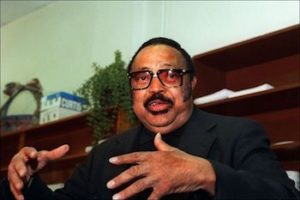
Hosea Williams
On this date, Hosea Williams was born in 1926. He was a Black activist.
Williams was the son of blind Black parents from Attapulgus, Georgia. After studying at Morris Brown College and Atlanta University, he found employment as a research chemist for the U.S. Department of Agriculture.
In 1963, he was ejected from the NAACP for being too militant, so he organized the Savannah, Georgia, movement. After his successful leadership in Savannah, he was personally recruited to the Executive Staff of the Southern Christian Leadership Conference (SCLC) by Martin Luther King, Jr., who referred to him as "my Castro."
In 1965, he directed SCLC's Summer Community Organization and Political Education Project (SCOPE), in which SCLC field staff and student volunteers registered thousands in anticipation of the passage of the Voting Rights Bill. (Freedom Summer was not an SCLC project.) He was arrested for civil disobedience and civil and human rights protests and demonstrations. With John Lewis, Williams led the Selma to Montgomery protest demonstration on March 7, 1965, which mounted police infamously attacked. That day, state troopers used nightsticks and tear gas on marchers, and the event became known as Bloody Sunday.
He was elected and served at every level of Representative Georgia government: Atlanta City Council, Georgia House of Representatives, and Dekalb County Commissioner. He controversially endorsed Ronald Reagan for president in 1980.
After becoming a member of the Atlanta City Council, he led a "Brotherhood March" in Forsyth County, which resulted in a violent confrontation with the Ku Klux Klan in 1987. The violence of the Klan and subsequent protest Williams led a week later became the most significant civil rights march since the 1960s. Two years later, Williams failed in his bid to be elected mayor of Atlanta.
For a time, his legacy as an American Civil Rights advocate seemed endangered by a series of run-ins with the law, most involving his erratic driving habits and several arrests on drunken driving charges. He was never found guilty of any charges of drunk driving and stayed out of legal trouble. The Rev. Joseph Lowery, former president of the Southern Christian Leadership Conference, who said he did not always see "eye to eye" with him, said Williams in his civil rights days, "could always inspire Blacks and anger Whites," a man without fear "because he felt he had the armor of God."
He was a key civil rights leader who marched alongside The Rev. Martin Luther King, Jr., during the integration struggle in the 1960s.
Hosea Williams died on November 16, 2000.